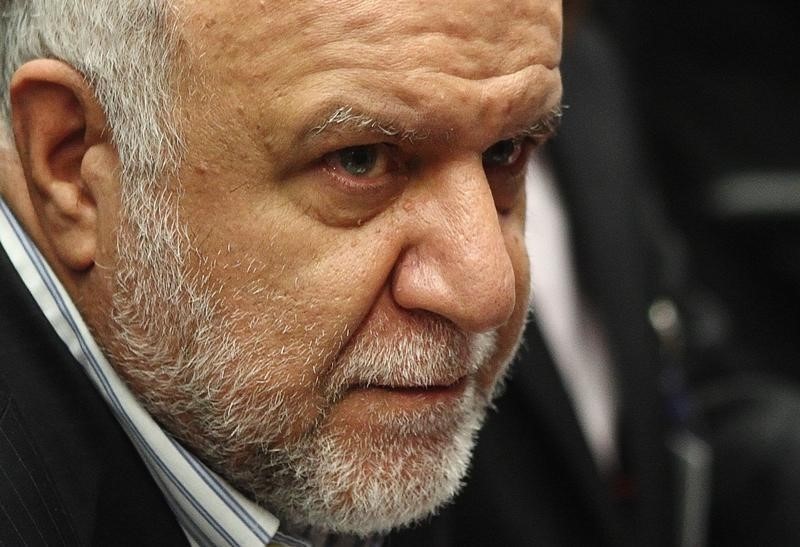By Ahmad Ghaddar and Vladimir Soldatkin
VIENNA (Reuters) - Iran and Iraq are resisting pressure from Saudi Arabia to curtail oil production, making it hard for the Organization of the Petroleum Exporting Countries to reach a deal to limit output and boost the price of crude when it meets on Wednesday.
OPEC sources told Reuters a meeting of experts in Vienna on Monday failed to bridge differences between OPEC's de facto leader, Saudi Arabia, and the group's second- and third-largest producers over the mechanics of output cuts.
On Tuesday, tensions rose further after Iran wrote to OPEC saying it wanted Saudi Arabia to cut production by as much as 1 million barrels per day (bpd), much more than Riyadh is willing to offer, OPEC sources who saw the letter told Reuters.
"It is a response to Saudi telling Iran what to produce," one of the sources said.
Iranian Oil Minister Bijan Zanganeh told reporters upon arrival in Vienna that he was not prepared to reduce output: "We will leave the level of production (where) we decided in Algeria."
OPEC, which accounts for a third of global oil production, made a preliminary agreement in Algiers in September to cap output at around 32.5-33 million bpd versus the current 33.64 million bpd to prop up oil prices, which have halved since mid-2014.
OPEC said it would exempt Iran, Libya and Nigeria from cuts as their output has been crimped by unrest and sanctions.
The deal was seen as a victory for Iran. Tehran has long argued it wants to raise production to regain market share lost under Western sanctions, when its political arch-rival Saudi Arabia increased output.
In recent weeks, Riyadh changed its stance and offered to cut its output by 0.5 million bpd, according to OPEC sources, while suggesting Iran limit production at around 3.8 million bpd - in line with or slightly above the country's current output.
Tehran has sent mixed signals, saying it wanted to produce as much as 4.2 million bpd. Iran's letter to OPEC suggested Saudi Arabia should cut output to 9.5 million bpd.
Iraq has also been pressing for higher output limits, saying it needs more money to fight the militant group Islamic State. Iran and Iraq together produce over 8 million bpd, only slightly behind long-time leader Saudi with 10.5 million bpd.
The argument between Iraq and Saudi Arabia mainly focuses on whether Baghdad should use its own output estimates to limit production or rely on lower figures from OPEC's experts.
As tensions within OPEC mounted, Saudi Energy Minister Khalid al-Falih said at the weekend that oil markets would rebalance even without an output-limiting pact. He had previously said Riyadh was keen for a deal.
One of Saudi Arabia's main allies, UAE Energy Minister Suhail bin Mohammed al-Mazroui, said on Tuesday the market would indeed rebalance itself within six months although an output deal would help speed the process.
Falih was not expected to land in Vienna before Tuesday evening, leaving little time for traditional pre-meeting discussions with other ministers.
"The feeling today is mixed," Indonesian Energy Minister Ignasius Jonan told reporters on Tuesday when asked about the prospects of a deal. "I don't know. Let's see."
GOLDMAN SEES DEFICIT
Brent crude (LCOc1) was down more than 4 percent, near $46 a barrel, after the Indonesian and Iranian comments. [O/R]
Some analysts including Morgan Stanley (NYSE:MS) and Macquarie have said oil prices will correct sharply if OPEC fails to reach a deal, potentially going as low as $35 per barrel.
Goldman Sachs (NYSE:GS), one of the most active banks in oil trading, said it saw prices averaging $45 a barrel until mid-2017 even without any OPEC deal and added the market was likely to move into a deficit in the second half of 2017.
A year ago, Goldman was saying a global glut would push oil prices to around $20. Prices fell to multi-year lows of $27 per barrel in January 2016.
Besides disagreements with Iran and Iraq, Saudi Arabia has also signaled it was unhappy with Russia's position.
Oil ministers from OPEC members Algeria and Venezuela traveled to Moscow on Tuesday to try to persuade non-OPEC Russia to take part in cuts instead of merely freezing output, which has reached new highs in the past year.
They made no comment as they emerged from their meeting. Russian Energy Minister Alexander Novak said he had no plan to travel to Vienna but could meet OPEC once it reaches a deal.
